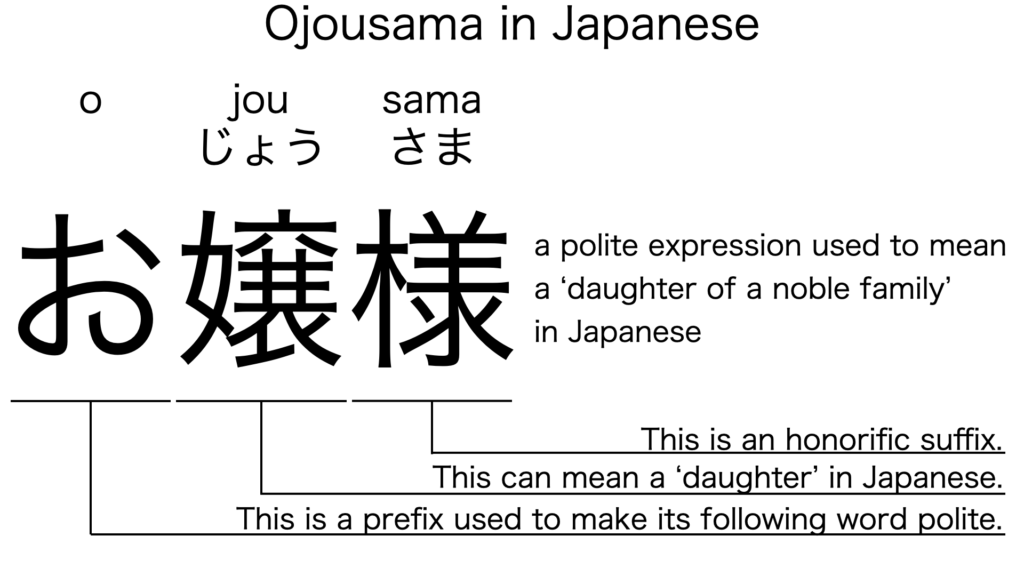What does “ojousama” mean in Japanese?
Native speakers use ojousama often to mean a ‘daughter of a noble family’ in Japanese. Perhaps, some Japanese learners know this word as it is sometimes used in Japanese movies, songs, novels, manga, anime, and the like. In this blog post, however, I’m explaining this word in detail based on its kanji mixed expression. And also, I’m explaining how to use it through example sentences. My explanations would help Japanese learners understand ojousama more clearly. Then, let’s get started!
Contents
Definition and meanings of “ojousama”
Let me start with the definition and meanings of ojousama.
- ojousama – お嬢様 (おじょうさま) : a polite expression used to mean a ‘daughter of a noble family’ or ‘daughter of a wealthy family’ in Japanese.
The definition and meanings are not that difficult, I think. To understand this expression more clearly, however, let me explain its kanji mixed expression in detail.
Ojousama in kanji
The kanji mixed expression of ojousama consists of the following three parts:
- o – お : a prefix used to make its following word polite.
- jou – 嬢 (じょう) : a noun occasionally used to mean a ‘daughter’ in Japanese. This can also work as plural.
- sama – 様 (さま) : an honorific suffix used to make its preceding word polite.
From these three parts, we can understand that ojousama is literally the polite expression for daughter. And actually, it is. It is used to refer to a daughter of a noble family in a polite way.

When we meet new kanji expressions, we should check their kanji characters in detail to understand their meanings clearly and deeply. In many cases, kanji characters tell us a lot about the meanings of the expressions they form. Actually, here, we could get the better understanding of ojousama through the detailed check above.
So far, I’ve explained the definition and meanings of ojousama together with its characters. Then, let me explain how to use it through the example sentences below.
How to say “daughter of a noble family” in Japanese
kanojo wa ano koukina kazoku no ojousama desu – 彼女はあの高貴な家族のお嬢様です (かのじょはあのこうきなかのじょのおじょうさまです)
She is a daughter of that noble family.
Below are the new words used in the example sentence.
- kanojo – 彼女 (かのじょ) : a pronoun meaning ‘she’ in Japanese.
- wa – は : a binding particle working as a case marker or topic marker. In the example, this works after kanojo to make the subject in the sentence.
- ano – あの : a determiner used before a noun which refers to something not close to the speaker. In the example, this is used before koukina kazoku to mean ‘that noble family’ in Japanese.
- koukina – 高貴な (こうきな) : a na-adjective meaning ‘noble’ or such in Japanese.
- kazoku – 家族 (かぞく) : a noun meaning a ‘family’ in Japanese. This can also work as plural.
- no – の : a case particle used to join two nouns or noun equivalent words. Normally, the first one can work as a modifier to describe the second. In the example, this is used to join ano koukina kazoku and ojousama to mean ‘a daughter of that noble family’ in Japanese. Word orders in Japanese and English are different, but the role of this case particle is similar to that of the English preposition, of.
- desu – です : an auxiliary verb used after a noun or adjective to make it polite. Probably, this is well known as a part of the Japanese desu form. In the example, this is used after ano koukina kazoku no ojousama to make it sound polite.
This is a typical usage of ojousama. It can work alone to mean a ‘daughter of a noble family’, but in this example it works as a part of the noun phrase to explicitly mean a ‘daughter of that noble family’ in Japanese.
Another example of “ojousama”
watashi wa ojousama ni nari tai – 私はお嬢様になりたい (わたしはおじょうさまになりたい)
I want to be a daughter of a noble family.
Below are the new words used in the example sentence.
- watashi – 私 (わたし) : a pronoun meaning ‘I’ in Japanese.
- ni – に : a case particle used to say what someone or something becomes after a change or action. In this example, this is used after ojousama to say what the speaker wants to be.
- nari – なり : one conjugation of the verb, naru, which means ‘to become’, ‘to get’, ‘to turn’, or just ‘to be’ in Japanese. In the example, it has been conjugated for the better connection with its following word.
- tai – たい : an auxiliary verb used after a verb to make its desire form. Probably, this is well known as a part of the Japanese tai form. In the example, this is used after nari to make its desire form, nari tai, which means ‘to want to be’ in Japanese.
This is another example of ojousama. In this example, it works together with the case particle, ni, to become the object in the sentence. When we want to refer to a daughter of a noble family in Japanese, anyway, this polite expression is a very good option.
Summary
In this blog post, I’ve explained the definition and meanings of ojousama in detail based on its kanji mixed expression. And also, I’ve explained how to use it through the example sentences. Let me summarize them as follows.
- ojousama – お嬢様 (おじょうさま) : a polite expression used to mean a ‘daughter of a noble family’ or ‘daughter of a wealthy family’ in Japanese. These three characters are literally the polite expression for daughter. When we want to refer to a daughter of a noble family in Japanese, this polite expression is a very good option.
Hope my explanations are understandable and helpful for Japanese learners.
Leave a Reply